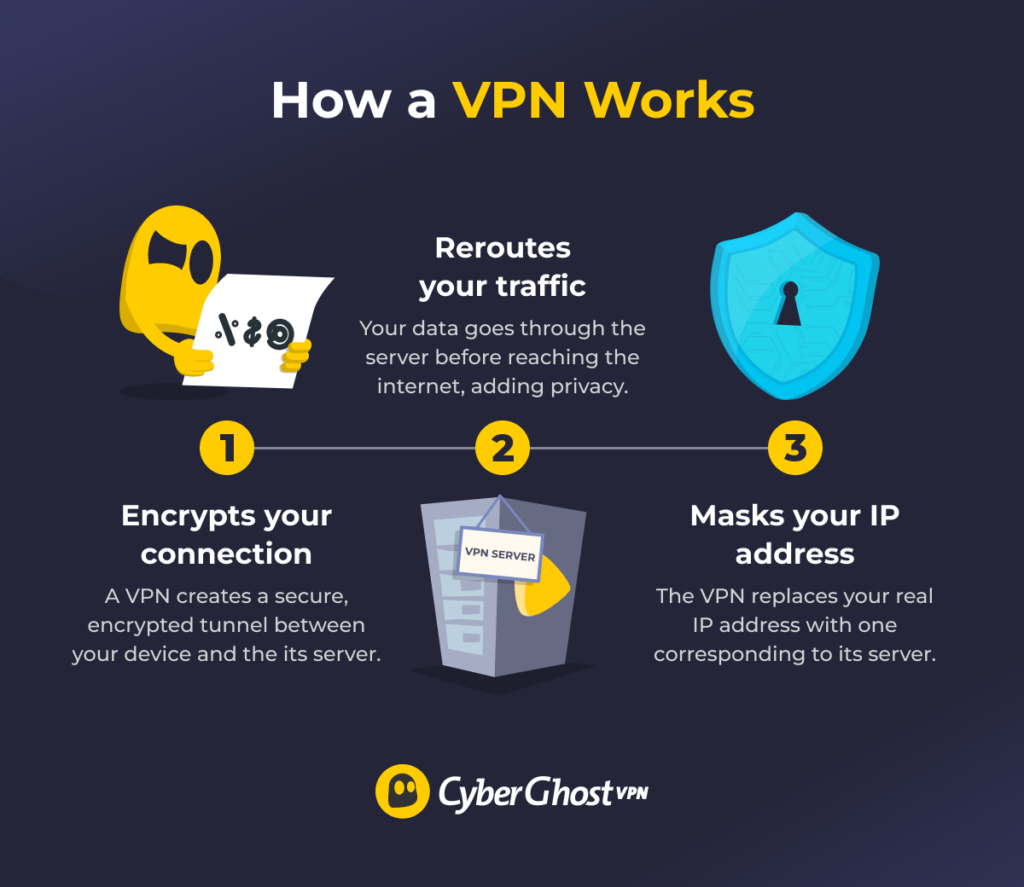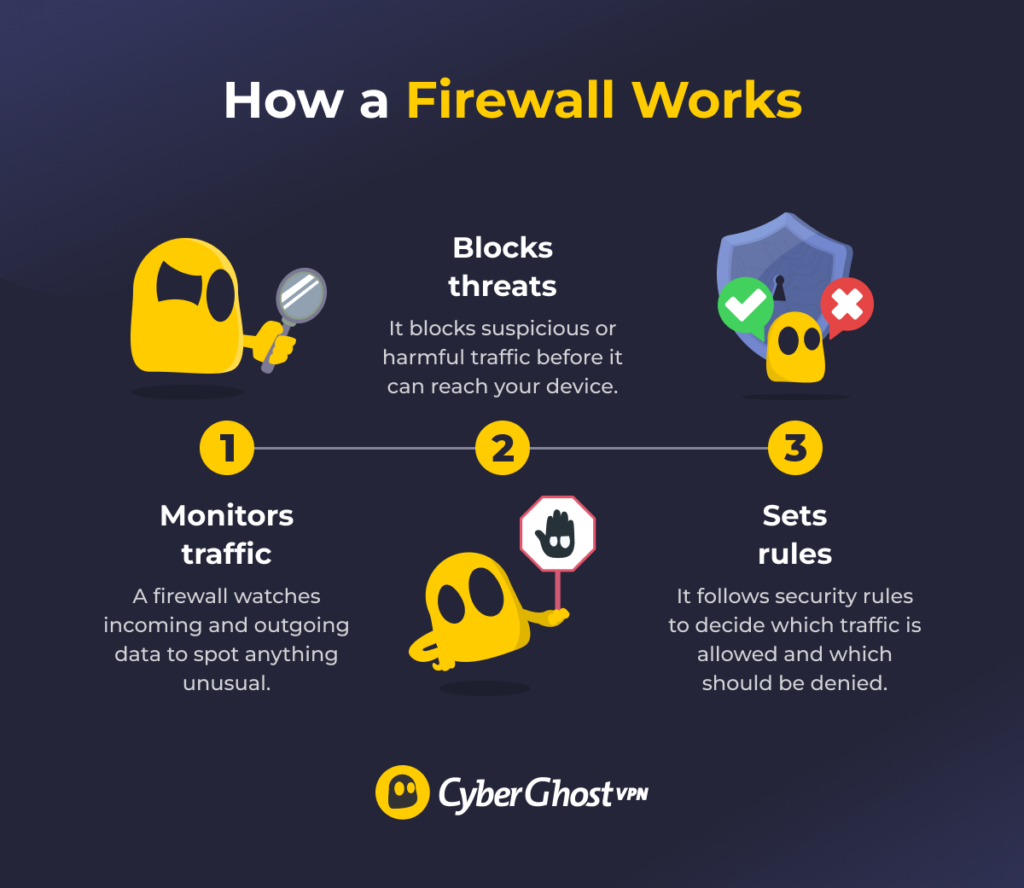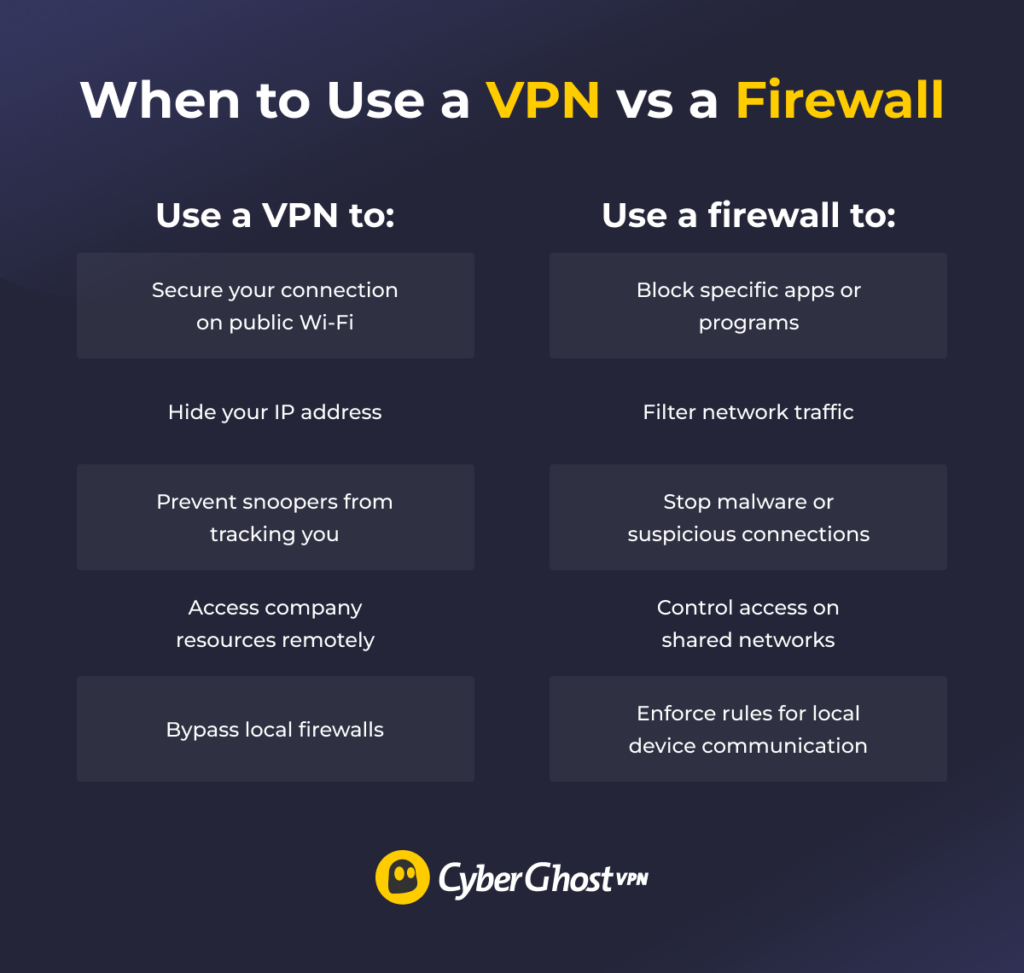Online threats don’t come in just one form, and neither should your defenses. That’s why VPNs and firewalls matter—they both protect you from different cyber risks. But if you use just one, you might leave yourself exposed.
A VPN (Virtual Private Network) encrypts your internet traffic and hides your IP address, which makes it harder for snoops to track your online activity. Firewalls, on the other hand, monitor and control traffic, which creates a safety barrier to block malicious actors and unwanted access.
They’re not interchangeable, and relying on one while ignoring the other could leave gaps in your security. This guide breaks down how VPNs and firewalls work, what they protect you from, and why combining them gives you stronger, more complete protection.
Firewalls don’t encrypt your traffic, so anyone spying on you can easily see your data if you don’t configure it properly. A VPN hides your IP address and encrypts your connection, making it harder for third parties to snoop on you. You can secure your data with CyberGhost VPN risk-free thanks to our 45-day money-back guarantee.
VPN vs Firewall: Side-by-Side Comparison
| VPN | Firewall | |
| Purpose | Protects your privacy and identity online | Blocks harmful or unwanted internet traffic |
| How it works | Encrypts your data and routes it through private servers | Filters traffic based on predefined network rules |
| Protects against | Snooping, tracking, data theft, and attacks like MitM | Hackers and unauthorized access |
| Hides IP address | ✅ | ❌ |
| Encrypts data | ✅ | ❌ |
| Best for | Public Wi-Fi, remote work, and private browsing | Controlling network access and blocking threats |
| Traffic direction | Mostly deals with outgoing traffic | Handles both incoming and outgoing traffic |
A VPN encrypts your data and hides your IP address. This protects your identity and hides your location, making it more difficult for websites, cybercriminals, or your ISP to track your activity. It’s especially useful on public Wi-Fi networks, which tend to leave your traffic exposed for anyone to see.
A firewall filters all of your internet traffic, both inbound and outbound. It inspects every bit of data and blocks anything that doesn’t meet the security rules. For example, schools, workplaces, and parents use them to restrict access to some websites or platforms. ISPs and governments also use content filtering tools, similar to firewalls, to censor information and stop you from accessing certain websites.
While a VPN protects your privacy, a firewall protects your system. And unlike a VPN, a firewall doesn’t encrypt your data or mask your location.
What Is a VPN and How Does It Work?

A VPN is a service that helps keep your internet activity private and secure. When you connect to a VPN, it reroutes your traffic through a secure, encrypted tunnel to a server. This tunnel masks your activity from your ISP, network admins, and other online snoops.
Since your traffic travels through a VPN server, you also get a new IP address from a location of your choice. For example, if you select a US server, you get a US-based IP address. Sites you visit see the server’s location instead of yours, so it’s harder for them to track where you are.
Types of VPNs
There are three main types of VPNs, each designed for a different use:
-
- Personal VPN: Lets you connect to a VPN server via a client—an app on your device that manages the connection. Helps individuals, families, or small businesses stay private online, secure personal data, and avoid online censorship.
- Remote access VPN: Using a similar server/client setup, a remote access VPN lets users connect to a secure network remotely. It’s often used by businesses to connect remote workers, freelancers, and travelers to their corporate network.
- Site-to-site VPN: Connects entire networks across different locations, like branch offices with a company’s headquarters. It lets anyone on the network securely share resources with each other. It’s usually managed by IT teams and isn’t relevant for individual users.
What Is a Firewall and How Does It Work?

A firewall is a security tool that monitors and controls which traffic your device or network can send and receive. It checks small units of data called data packets against a set of rules based on factors like their source, destination, port, or protocol. If the data packet doesn’t meet the criteria, the firewall blocks it. This helps stop unwanted or malicious traffic and restrict access to specific apps, services, or websites.
Some firewalls come with preset rules, but you can also set your own. You can usually configure them to:
- Block or allow traffic from specific IP addresses, domains, or applications.
- Filter content based on protocols or keywords.
- Control access based on time of day, network type, or other conditions.
Firewalls don’t scan for viruses or remove malware, but they can block threats from getting into your system and limit how far a malicious infection can spread if one manages to get in.
Types of Firewalls
Here are some of the most common types of firewalls and how they work:
-
- Proxy firewall: Intercepts and inspects traffic at the application layer; hides internal networks.
- Packet-filtering firewall: Filters traffic based on IP addresses, ports, and protocols.
- Stateful inspection firewall: Monitors active connections and ensures traffic is part of valid sessions.
- Circuit-level gateway: Verifies session initiation (handshakes) without inspecting content.
- Next-generation firewall (NGFW): Includes deep packet inspection, malware blocking, and application control.
Firewalls can be categorized as host-based or network-based:
-
- Host-based firewall: Runs on individual devices, like a laptop, phone, or server, and monitor traffic only for that specific machine. Most modern operating systems come with a built-in host firewall—for example, Windows Defender Firewall or macOS Application Firewall.
- Network-based firewall: Protects all devices on the same network. They can be hardware (like a router with firewall settings) or cloud-based systems in larger network setups.
Many organizations combine both firewall types. Host-based options control what happens on each device, while network-based firewalls deal with the entire network.
When to Use a VPN or Firewall

A VPN should be your top choice when you need to secure your connection on public Wi-Fi, hide your IP address, or protect your browsing activity from your internet provider. It’s also useful when you’re working remotely and need safe access to private company resources. If you’re stuck trying to view restricted content blocked by local firewalls, a VPN can help you go around it, too.
A firewall works best when you want to control access and block potential threats. It can stop certain apps from going online, filter traffic on a home or office network, or prevent malware from reaching your device. It’s especially useful on shared networks where managing how devices connect and what they connect to is just as important as keeping data private.
Firewall vs VPN: Do You Need Both?
Yes, they offer different types of protection, so combining them both can protect you on multiple fronts. While a firewall blocks or filters traffic, a VPN encrypts your data and hides your IP address to safeguard your online privacy. So, if you want to cover both these aspects, using both is the best solution.
Most modern computers come with a built-in firewall by default. However, if you’re looking for a more advanced or customizable firewall, you can also buy them from third-party providers.
Some firewalls (especially those that organizations use) have built-in VPN capabilities. These combine privacy and access control in one system. But if the firewall device fails, you could lose both VPN and network protection. Performance can also dip if the firewall handles too much traffic at once.
For most people, the easiest and most reliable setup is using a trusted VPN app alongside a firewall already built into your device. You can try CyberGhost VPN to encrypt your traffic, hide your IP address, and give you an added security boost while surfing the web.
Bottom Line: Firewalls and VPNs Work Together
VPNs and firewalls can both increase your digital protection, but in different ways. A VPN keeps your connection private by encrypting your data and hiding your IP address. A firewall blocks unwanted or suspicious traffic from reaching your device or network. If you want to protect your data, bypass local restrictions, or stay safe on unsecured networks, you don’t have to rely on just one or the other. Using a firewall and a VPN together gives you stronger, more complete coverage.
CyberGhost VPN makes it simple to take control of your online privacy without compromising speed, access, or ease of use. Combine it with a good firewall setup, and you’ve got a solid foundation for more secure browsing no matter where you’re connecting from.
FAQ
Can a VPN replace a firewall?
No, a VPN can’t replace a firewall because they serve different purposes and address different types of risks. A VPN encrypts traffic and hides your IP address, which protects your privacy and helps go around local restrictions. A firewall filters outgoing and incoming traffic, blocking unauthorized access or malicious requests.
Can a VPN be blocked by a firewall?
Yes, it can. Advanced firewalls can detect and block VPN traffic using deep packet inspection. This technique checks the content within data packets, not just headers, which allows firewalls to identify VPN traffic. Some networks apply them on purpose to prevent VPN use.
Do VPNs and firewalls serve the same purpose?
No, VPNs and firewalls have different functions. A VPN encrypts traffic and masks your real IP address and location. This helps protect your data, stopping your ISP, network admins, or anyone else watching your connection from spying on you and where you are. A firewall monitors and filters malicious traffic to block cyber threats and unauthorized access.
Which offers better protection: a VPN or a firewall?
Neither is “better” than the other because they protect you in different ways. A VPN safeguards your privacy and prevents surveillance, while a firewall blocks unauthorized access and defends your device or network against threats. For the best protection, use both—a VPN for secure, private connections and a firewall for traffic control.
Can I use a VPN and a firewall together?
Yes—it’s recommended to use both for a layered protection against cyber threats. A VPN keeps your connection private, while a firewall stops harmful traffic from reaching your device. Adding antivirus software can boost your security even more by helping detect and remove malware.
Which one is better for privacy: VPN or firewall?
A VPN is more effective when it comes to protecting your privacy. It encrypts your internet traffic and hides your IP address, making it more difficult for websites, advertisers, ISPs, and other snoops to track you. Firewalls don’t offer encryption—they’re made to filter and block unwanted traffic, not hide your connection.
Are firewalls effective against online tracking like VPNs?
No. While firewalls block malicious traffic, they don’t hide your IP address or encrypt browsing data like a VPN service does. To protect against online tracking, use a combination of privacy tools, including a VPN and a privacy-focused browser with anti-tracking features.
Should I enable both VPN and firewall on my device?
Yes—having both a VPN and a firewall gives you a multi-layered defense. A VPN secures your connection to the internet, while a firewall filters malicious activities and protects your device or internal network from attacks.
How do VPNs and firewalls affect internet performance?
VPNs may slow things down due to encryption and rerouting, while firewalls can add processing overhead as they inspect traffic. Luckily, modern hardware and efficient VPN protocols usually keep any slowdown to a minimum.
What is a VPN in a firewall?
A firewall with VPN capability combines traditional firewall security with remote access. These firewalls let people connect remotely to the network using encrypted VPN tunnels. They can also inspect that traffic and apply security rules, like restricting access to certain resources or blocking untrusted connections. This setup is common for businesses where teams need access to internal files from different locations.


Leave a comment